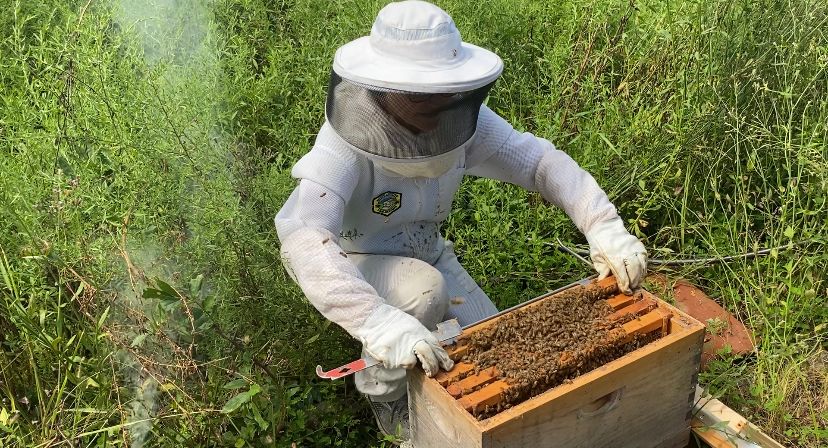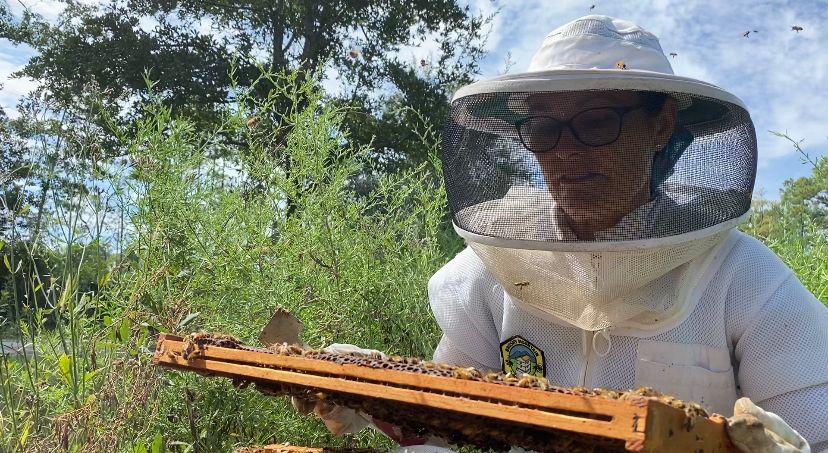WILMINGTON, N.C. — The Tar Heel State is starting to see cooler weather and signs of fall. For autumn lovers, that’s great news, but for our pollinators, that means a lack of food source and a tough few months ahead.
What You Need To Know
There are steps beekeepers can take to ensure their hives' survival throughout the fall and winter
Those include making sure the hive has a queen, checking diligently for predators and mites and making sure they have enough food
Bees will be collecting food for the winter and creating a new generation of bees to begin working in the spring

Bees are some of our most important pollinators. Susan Warwick, a beekeeper with the New Hanover County Beekeepers Association, says that ensuring their survival is extremely important. Without bees, the world would be a much different place.
“They’re important because your plates gonna look different,” Warwick said. “If we didn’t have honeybees, a third of your plate would be gone.”
In the fall and winter, it can be tough for the bees to survive. Beekeepers will have to work hard ahead of time to keep them alive for the next few months.
“They’re not gonna be foraging. I mean you can look around, there’s not a whole lot of stuff going on this time of year as far as flowers blooming for the bees to get the nectar and the pollen from,” Warwick said. “So the bees that are hatched out and emerged in October, pretty much they have to make it all the way to February.”
That’s incredible when you compare that lifespan to the summer bees who only live about four to six weeks, literally working themselves to death.
If that wasn’t enough, they also face threats such as animal predators, losing queens and disease-spreading mites like the Varroa mite.
“It causes all kinds of problems. The issue is it carries viruses, and it infects the bees. It gives them one virus in particular, the deformed wing virus, and then you’ve got a bunch of bees in your hive that can’t fly, and you’ve lost your hive,” she said.
Warwick, who has been working with bees for 10 years, has seen a hive succumb to disease before.

“My dad actually had bees when I was in middle school, and I really thought he had lost his mind. I mean being in middle school you’re just like ‘What, you’ve got a bunch of stinging creatures in our backyard?’” Warwick recalled. “Unfortunately during that time, there was another pest that came along. It was a tracheal mite, and it wiped out all the bees, and no one could figure out what was going on.”
That experience showed her just how important it is to take extra steps in these upcoming weeks to ensure the hives' survival.
“Definitely check for food stores. Make sure the pests are not there after the bees, the mites, the moths, the beetles,” Warwick said. “Then you want to make sure you’re just keeping everybody safe.”
The bees will be busy throughout the fall collecting pollen to ensure that they have enough food throughout the winter. They will also be creating a new generation of bees to start working and collecting nectar and pollen come spring.
The New Hanover County Beekeepers Association has lots of resources and information for beekeepers to use, especially as we approach fall. The group meets every third Thursday of the month at The Arboretum at 6206 Oleander Dr. in Wilmington.



